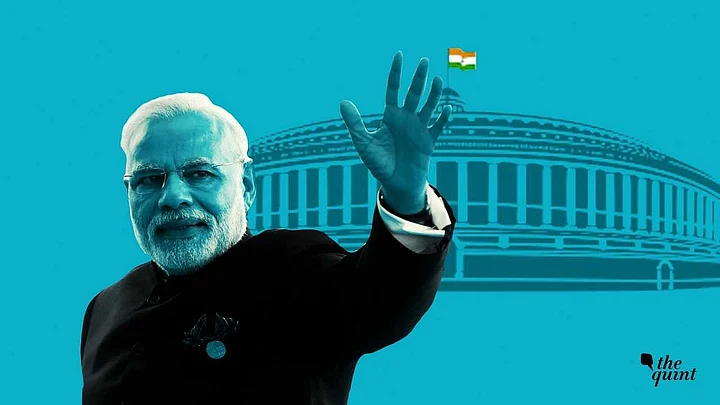Even by the Narendra Modi government’s dubious standards, the ongoing winter session of Parliament is unprecedented. And it is not difficult to understand why the last vestiges of pretence at democratic engagement were dropped this time, time-honoured conventions thrown out of the window, and Parliament allowed to go into a free fall without a safety net.
There is only one thing on the government’s mind in this penultimate session before the crucial Uttar Pradesh Assembly polls early next year: to shield Prime Minister Narendra Modi’s image from further damage after his ignominious retreat on the three new agricultural laws, which had agitated farmers across north India.
For Modi, Saving Face Was Crucial
For a leader who once boasted about his “56-inch chest,” the decision to roll back his own laws is a huge climbdown. Modi hoped to extricate himself from a sticky situation with an apology on national television and a vow to repeal the laws.
But there was one more hurdle to cross before he could close a chapter of his tenure he would rather forget – Parliament. This is where the government would have to go to revoke the laws as promised. This is also where the Opposition was waiting with barely disguised eagerness to put the prime minister in the dock, finally.
It is inconceivable that a government with as much hubris as the current dispensation would allow its leader to go through the humiliation of dodging brickbats in Parliament on an issue on which he is already on the backfoot. A devilish strategy was crafted to firewall him and shut down the Opposition. If Parliament became a casualty, so be it.
Previous sittings, particularly the sessions after Modi’s triumphant second coming with a bigger majority, have shown that this government has no compunctions about bending rules, bypassing established norms of parliamentary democracy, and using any means – fair or foul – to get its way.
The plan came into effect even before the session began, with Modi skipping the session-eve all-party meeting. It is not compulsory for prime ministers to attend these meetings, but it is customary. More so in this case, because the big-ticket item on the agenda of the winter session was the repeal of farm laws.
Modi, Unsurprisingly, Missing From House
This should have been Modi’s moment to set the narrative straight, but he ducked. It was ironic because just a fortnight earlier, he had spun the repeal into a major gesture towards national unity by announcing it through a televised address to the nation on Gurpurab. It’s impossible to miss the symbolism, since Punjab has been the hub of the agitation against the new laws.
Next, the government rammed through the repeal in the Lok Sabha without a discussion, just as it had steamrolled the laws without debate last year. The Opposition’s demands for a discussion were rejected. Needless to say, Modi was missing from the house.
It was similarly pushed through in the Rajya Sabha by voice vote. Significantly, the day before the vote in the Rajya Sabha, the upper house suspended 12 Opposition members for the entire session on questionable grounds. The reason given was that these MPs had caused disruptions on the last day of the previous session and lowered the dignity of the Parliament.
This is unprecedented and no ruling dispensation has tried to shut down the Opposition in such a brazen manner before. And it’s obvious why the government resorted to these tactics. Unlike in the Lok Sabha, the Bharatiya Janata Party (BJP) does not have a brute majority in the Rajya Sabha. Their numbers are evenly poised.
The Opposition failed to corner the government in the Lok Sabha but it could have created several embarrassing moments for Modi in the Rajya Sabha. With the Opposition’s numbers depleted by 12, it was easy for the government to shout down the Opposition and ram through the repeal of the laws without debate, as it did in the other house.
In fact, Congress MP Abhishekh Singhvi hinted as much when he tweeted after the suspension that “the BJP has now gone ahead of the majority number and can easily pass listed bills through the Upper House.”
It is interesting that having successfully protected Modi in Parliament, Minister for Parliamentary Affairs, Prahlad Joshi, has now suggested that the suspension of the 12 Opposition MPs could be revoked if they apologise. So, he has opened a window for negotiations after having achieved the purpose of suspension.
Why Media Scares the Government
There is one more prong to the government’s strategy of ensuring a safe passage for Modi and putting the controversy over the farm laws behind. This is to continue to restrict media entry into Parliament using the excuse of COVID-19.
Although COVID-19 restrictions have been eased everywhere, they continue to be strictly enforced in Parliament, where only a small group of mediapersons is allowed inside on a rotational basis. In an unprecedented move, the media held a protest demonstration near Parliament to demand that the government respect democracy, transparency and a free press.
Unfortunately, when the image of the supreme leader becomes of paramount importance, everything else recedes into insignificance.
(Arati R Jerath is a Delhi-based senior journalist. She tweets @AratiJ. This is an opinion piece and the views expressed above are the author’s own. The Quint neither endorses nor is responsible for the same.)
